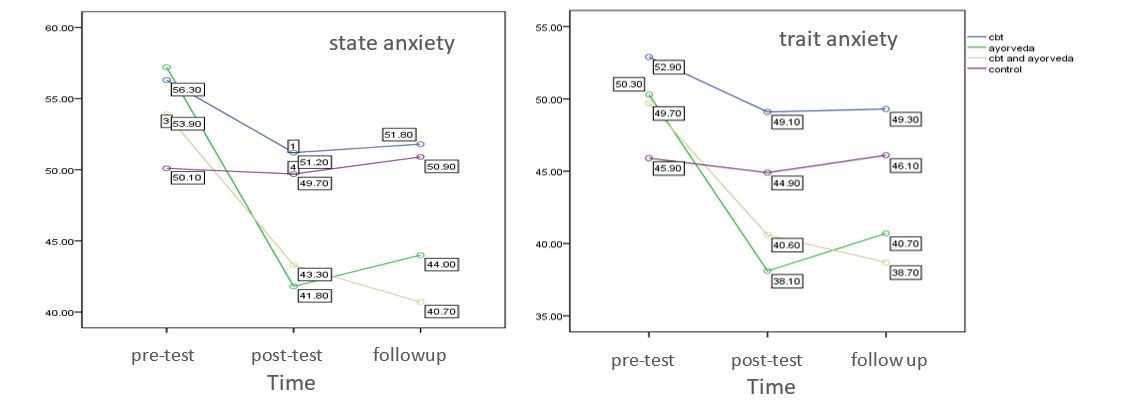1. Sadock BJ, Sadock VA, Ruiz P. Synopsis of psychiatry: behavioral sciences, clinical psychiatry: Arjamand Publications;2022.
2. WHO. Division of mental health & prevention of subtance abuse, programme on mental health.2013.
3. Prisnie JC, Sajobi TT, Wang M, Patten SB, Fiest KM, Bulloch AGM, et al. Effects of depression and anxiety on quality of life in five common neurological disorders. General hospital psychiatry. 2018;52:58-63. [
DOI:10.1016/j.genhosppsych.2018.03.009] [
PMID]
4. Muramatsu K, Miyaoka H, Kamijima K, Muramatsu Y, Fuse K, Yoshimine F. Prevalence and comorbi dity of anxiety and depressive disorders in studies of PRIME-MD and PHQ (Patient Health Questionnaire) in Japan. Anxiet Disorder Achieve. 2021:93. [
DOI:10.5772/intechopen.97218]
5. American Psychiatric Association. Diagnostic and statistical manual of mental disorders. Rezaei F, Fakhraei A, Fermand A, Nilufri Ali, Jeanette Hashemi A, Shamlou F (Persian translator).5th edition. Arajmand Publications;2021.
6. Gorka SM, Young CB, Klumpp H, Kennedy AE, Francis J, Ajilore O, et al. Emotion-based brain mechanisms and predictors for SSRI and CBT treatment of anxiety and depression: a randomized trial. Neuropsychopharmacology : official publication of the American College of Neuropsychopharmacology. 2019;44(9):1639-48. [
DOI:10.1038/s41386-019-0407-7] [
PMID] [
]
7. Ali S, Rhodes L, Moreea O, McMillan D, Gilbody S, Leach C, et al. How durable is the effect of low intensity CBT for depression and anxiety? Remission and relapse in a longitudinal cohort study. Behaviour research and therapy. 2017;94:1-8. [
DOI:10.1016/j.brat.2017.04.006] [
PMID]
8. Mishra LC. Scientific basis for Ayurvedic therapies: CRC press;2004. [
DOI:10.1201/9780203498583]
9. Ghodke Y, Joshi K, Patwardhan B. Traditional Medicine to Modern Pharmacogenomics: Ayurveda Prakriti Type and CYP2C19 Gene Polymorphism Associated with the Metabolic Variability. Evidence-based complementary and alternative medicine : eCAM. 2011;2011:249528. [
DOI:10.1093/ecam/nep206] [
PMID] [
]
10. Chatterjee B, Pancholi J. Prakriti-based medicine: A step towards personalized medicine. Ayu. 2011;32(2):141-6. [
DOI:10.4103/0974-8520.92539] [
PMID] [
]
11. Ell C, Heidel RE, Sunega J, Drisko J. Ancient Wisdom: Can Ayurvedic Prakruti Provide Invaluable Insights into Integrative Medicine? Ayu J Health. 2017;15(3):27-34.
12. Mills PJ, Peterson CT, Wilson KL, Pung MA, Patel S, Weiss L, et al. Relationships among classifications of ayurvedic medicine diagnostics for imbalances and western measures of psychological states: An exploratory study. Journal of Ayurveda and integrative medicine. 2019;10(3):198-202. [
DOI:10.1016/j.jaim.2018.02.001] [
PMID] [
]
13. Cardona Sanclemente LE. Ayurveda for Depression An Integrative Approach to Restoring Balance and Reclaiming Your Health. Berkeley, California: North Atlantic Books;2020.
14. Delavar A. Educational and psychological Research. Tehran, publishing house.2009.
15. Wilson CR, Voorhis V, Morgan BL. Understanding Power and Rules of Thumb for Determining Sample Sizes. Tutorial Quantitative Method Psychol. 2007;3(2):43‐50. [
DOI:10.20982/tqmp.03.2.p043]
16. VanVoorhis CW, Morgan BL. Understanding power and rules of thumb for determining sample sizes. Tutorial Quantitative Method Psychol. 2007;3(2):43-50. [
DOI:10.20982/tqmp.03.2.p043]
17. Frawley D. Ayurveda and the Mind: The Healing of Consciousness: Lotus Press (WI);1997.
18. Beck AT, Steer RA, Brown G. Beck Depression Inventory-II (BDI-II) [Database record]. APA PsycTests.1996. [
DOI:10.1037/t00742-000]
19. Rajabi G, Karjuksmai S. Psychometric properties of a Persian language ver-sion of the beck depression inventory second edition (BDI-II). Educat Measure Quarter. 2011;3(10):139-57.
20. Zsido AN, Teleki SA, Csokasi K, Rozsa S, Bandi SA. Development of the short version of the spielberger state-trait anxiety inventory. Psychiatry research. 2020;291:113223. [
DOI:10.1016/j.psychres.2020.113223] [
PMID]
21. Spielberger CD, Gorsuch RL. State- trait anxiety inventory for adults.
22. Mehram B. Normization of Spielberger anxiety test in Mashhad city. Master's thesis, Ministry of Science, Research and Technology, Allameh Tabatabai University1373.
23. Gholami Booreng F, Mahram B, Kareshki H. Construction and Validation of a Scale of Research Anxiety for Students. IJPCP. 2017;23(1):78-93. [
DOI:10.18869/nirp.ijpcp.23.1.78]
24. Null G, Pennesi L. Diet and lifestyle intervention on chronic moderate to severe depression and anxiety and other chronic conditions. Complementary therapies in clinical practice. 2017;29:189-93. [
DOI:10.1016/j.ctcp.2017.09.007] [
PMID]
25. Kolarević M. Depression between biomedicine and Ayurvedic medicine: a case of patient experiences in Slovenia (Doctoral dissertation, Univerza v Novi Gorici, Fakulteta za podiplomski študij.
26. Shahriari H, Zare H, Aliakbari MGD, Sarami Foroushani R. Effectiveness of Cognitive-Behavioral Interventions in the Treatment of Generalized Anxiety Disorder: A Systematic Review and Meta-analysis. J Rafsanjan Univ Med Sci Health Serv. 2018.
27. Beck AT, Freeman A, Davis DD. Cognitive therapy of personality disorders (2nd ed.). Guilford Press.2004.
28. Rao PR. A multiple case study of practitioners and patients in the ayurvedic treatment of anxiety disorder (Doctoral dissertation, Saybrook University).

